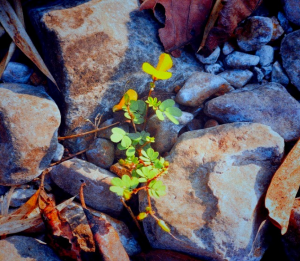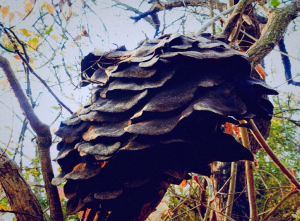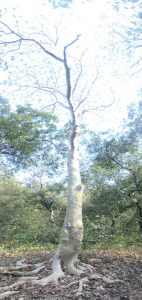Last week, I ventured out of the house for the first time since the lockdown. It was for a walking trek to the Sanjay Gandhi National Park in Mumbai. The Shilonda trail within the forest is a walk of around 4 KM both ways. Deep in the forest with silence around you and the only sound being that of birds, animals, and leaves rustling in the wind, the experience is at a much deeper level.
Nature has a lot to teach us. What it calls for is a pause in our daily routine and take that step to seep into a stillness that surrounds you. A walk across a forest trail can infuse you with new energy and provide a different perspective. Some things that came my way had me do a rethink. Allow me to share a few of those.
You can bloom even in the wilderness – walking on the trail amongst trees, rocks, gravel, and boom, you suddenly come across a flower blooming from nowhere. Or a beautiful fan-shaped leaf. Nature provides us with the best lessons in being unique and thriving through our own sets of skills and competencies.
You may be the odd one out, but you fit in perfectly within the larger scheme of things.

As we continued along the tracks, we saw the fire lines on both sides to prevent the fire from spreading and turning everything into dust in minutes. Life, as in nature is unpredictable. You need to be prepared for eventualities.
Having defined guardrails for important events helps us be prepared to handle the unexpected.
Nature is home to insects of all kinds. We saw wasps that walked by but did not bite us. I think we were more scared of it! It stayed on its track and reached its destination circumventing us as we sat on rocks for a breather.
Stay determined and focused on your goal. Life will throw curves and googlies. Learn to navigate those.
One of the most beautiful creations in the forest is the symbiotic relationship that exists between the Pagoda Ants and the Rufous Woodpecker. The main diet of the Rufous woodpecker is black tree ants and one of the main items in the diet of the black tree ants is bird eggs. Yet, you will find the woodpecker laying its eggs in the house of the Pagoda ants and the ants protecting those eggs! When the eggs are hatched and the mother woodpecker feeds her young ones, the littered crumbs act as food for the ants! It is amazing to see how this relationship thrives.
People who disagree and have divergent views can learn to work together and converge on a common platform.

Trees are another fascinating facet of forests. Nowhere else can one find such a canvas of greenery. Dark green. Light green. The hue of a parrot. The shiny glossy green leaf. The green of algae in the still waters. Then you have the Lichens that have tell-tale white lines on its bark. The thickness of the lines is an indication of how clean and unpolluting the surrounding environment is. Thin white lines indicate a high degree of pollution. Nature reveals everything. Simply put, you cannot hide anything from nature.
Then there is this tree with white bark – Sterculia urens. It is said that the British gathered around that tree for direction whereas, in many Indian superstitions, the white tree in the night looks like a lady ghost draped in white clothes. How perceptions vary! And little wonder that the tree is called ‘Bhotya’ (ghost) in Marathi.
Perceptions are born from our own (lack of) understanding of situations. Reality may be quite different.
The next time you visit nature look carefully. There is so much to learn.

The views and opinions published here belong to the author and do not necessarily reflect the views and opinions of the publisher.



Be the first to comment on "When was the last you looked at nature?"